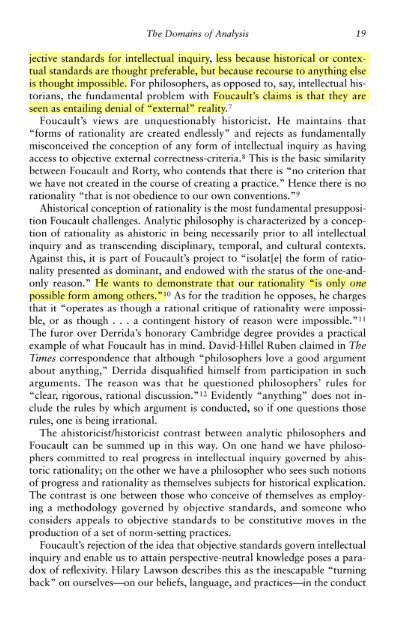Starting with Foucault: An Introduction to Genealogy, Second Edition
Starting with Foucault: An Introduction to Genealogy, Second Edition
Starting with Foucault: An Introduction to Genealogy, Second Edition
You also want an ePaper? Increase the reach of your titles
YUMPU automatically turns print PDFs into web optimized ePapers that Google loves.
The Domai~s uf At.l,ak)jsis 19jective standards for intellectual inquiy9 less bemuse his<strong>to</strong>rical or contextualstandards are thought preferable, but because recourse <strong>to</strong> anything elseis thought. impossible, For philosophers, as opposed <strong>to</strong>, say? inteIfectual his<strong>to</strong>rians,the fundamental problem <strong>with</strong> <strong>Foucault</strong>'s claims is that they areseen as entailing denial of 'kxternal") reality,'<strong>Foucault</strong>" views are unquestiona biy his<strong>to</strong>ricist. He maintains that"forms of rationality are created endlessly"' ad rejects as fundamentallymisconceived the coneeprion of any farm ol intellectual inquiry as havingaccess <strong>to</strong> objective external correctness-criteria." This is the basic similariqbetween <strong>Foucault</strong> and Rorty3 who contends that there is ""no criterion thatW have not created in the cowse of creating a practke*" Hence there is norationalitf: "that is not obedience <strong>to</strong> our own ~onventions.'*~Ahis<strong>to</strong>rical conception of rationality is the moss fundamental presuppositionFoucautt challenges. <strong>An</strong>alytic philosophy is characterized by a conceptionof rationaliq as ahistsric in being necessarily prior <strong>to</strong> all intellectualinquiy and as transcending disciplinary* temporal, and cultural contexts.Against this, it is part of^ FoucauIt"s project <strong>to</strong> "isolatld the form of rationalitypresented as dominant, and endowed <strong>with</strong> the status of the one-and-only reason." He wants <strong>to</strong> demonstrate that our rationali~ "is only Gonepossible form among others.""@ As for the tradition he opposes, he chargesthat it "agerates as though a rational critique of rationality were impossible,or as though . . . a contingent his<strong>to</strong>ry of reason were impossible*"i1The furor over Berrida" hhonorary Cambridge degree provides a practicalexample of what <strong>Foucault</strong> has in mind, David-Hillel Ruben claimed in TG;)eTimes correspondence that although ""philosophers love a good argumentabout anything,'Werrida disqualified himself from participaticln in sucharguments, The reason was that he questioned yhilosophers"ules for"clear, rigorous, rational di~cussion,"~ ""Evidently ""anything" &es not includethe rules by which argument is conducted, so if one questions thoserules, one is being irrational.The akis<strong>to</strong>ricist/hissoricist contrast between analytic phiXosophrers and<strong>Foucault</strong> can he summed up in this way, On one hand we have pbiloso-ph~rs committed <strong>to</strong> real progress in intellectual inquiry governed by ahis<strong>to</strong>ricrationality; on the other we have a philosopher who sees such notionsof progress and rationality as themselves subjects h his<strong>to</strong>rical expiication.The contrast is one between those who conceive of themselves as employinga methodology governed by objeaive standards, and someone whaconsiders appeals <strong>to</strong> objective standards <strong>to</strong> be constitutive moves in theproduction of a set of norm-setting practices.<strong>Foucault</strong>'s rejection of the idea that objeclcive standards govern intellectualinquiry and enable us <strong>to</strong> attain perspective-neutral knowledge poses a paradoxof refiexivity. Elilary Lawson describes this as the inescapable "turningback" on ourselves n our beliefs, langtrage, and practices-in the conducf


